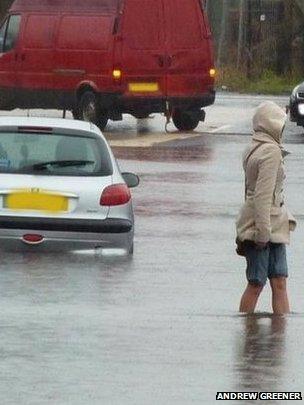Prof Sir John Beddington warns of floods, droughts and storms
- Published
- comments

Prof Beddington fears more flooding is likely
The UK government's chief scientist has said that there is already enough CO2 in the atmosphere for there to be more floods and droughts over the next 25 years.
Prof Sir John Beddington said there was a "need for urgency" in tackling climate change.
He said that the later governments left it, the harder it would be to combat.
Prof Beddington made his comments in the final week of his tenure as the government's chief scientific adviser.
"The [current] variation we are seeing in temperature or rainfall is double the rate of the average. That suggests that we are going to have more droughts, we are going to have more floods, we are going to have more sea surges and we are going to have more storms.
"These are the sort of changes that are going to affect us in quite a short timescale," he warned.
Prof Beddington's comments come at a time when "climate sceptics" have been challenging claims by scientists that the release of CO2 into the atmosphere is increasing global temperatures.
Sir John Beddington: Leaders should 'take action'
Other critics have argued that even if the burning of fossil fuels is changing the planet's climate, the reduction of CO2 levels by the world's emerging nations is unrealistic, impractical and undesirable.
Prof Beddington's blunt response is: "The evidence that climate change is happening is completely unequivocal."
But the issue, he says, has been clouded by the fact that the planet's climate system operates slowly to changes and so there are long delays in CO2 level rises in the atmosphere resulting in changes to weather patterns.
"So the next 20 or 30 years are going to be determined by what's up there now."
Governments have agreed to try to keep the rise in average global temperatures to below 2C. Given the slow progress in attempts to curb CO2 emissions at successive climate change talks, many experts believe that target to be unrealistic.
Prof Beddington made his comments in a wide-ranging interview with BBC News to coincide with the end of his tenure as the government's chief scientific adviser.
Badger cull
In it he says he did not give advice on the pilot badger cull trials which were aborted late last year after it emerged that there were more badgers in the proposed cull sites than had previously been estimated. The aim of the pilots, which are due to be tried again later this year, is to reduce the rate of increase in the spread of TB in cattle.
Some scientists believe that the cull will offer little if any benefit, with one expert, Lord Krebs, describing it as a "crazy scheme".
Prof Beddington says he gave advice in general terms about the scientific consensus on the issue. He says he told ministers: "You won't get any improvement for four or five years, the level of improvement is modest, around a 16% reduction and that there will be an increase in infections initially as badgers move out.
"It's interesting that the identical evidence was used in Wales to decide not to have a badger cull and in England to have a cull," he added.
Homeopathy
He expressed irritation that government did not pay heed to his scientific advice on the ineffectiveness of homeopathy beyond the placebo effect. Homeopathic treatments are available on the NHS and the government's Medicines and Healthcare Regulatory Agency licenses remedies.
"It is irritating. The political decision is that that they wish to continue [licensing homeopathic products and having them available on the NHS] to continue choice. It is one that is arguable on a political point. But the scientific advice from myself and the chief medical officer, Sally Davies, is completely unequivocal: 'This does not work'.
"The occasions where that sort of scientific advice - where it's unequivocal - has been ignored [by government] are very, very rare."
Research cuts
Prof Beddington is among those credited with having limited the cuts to the UK's research budget when the Chancellor, George Osborne, was making his first Autumn Statement in 2010.
However, he could not prevent a deep cut of £1.6bn in spending for research equipment, buildings and infrastructure. Prof Beddington has gradually won back that money in a series of announcements of new money for science by the Treasury. But these have been targeted at specific areas of science, such as graphene research, nanotechnology and space, thought to be important to the growth of UK economy.
This has won support for science from the Treasury. But because the funding is directed to these specific areas, there is less money overall to fund staff and cutting-edge research outside those deemed by Prof Beddington and senior members of the research community as strategically important. So how does he respond to the charge of allowing the chancellor to "pick winners"?
"We've asked ourselves what are the areas where there is likely to be most growth? I don't see that as picking winners because picking winners tends to support a particular technology. This is a very sensible thing to be doing."
Follow Pallab on Twitter @bbcpallab, external
- Published23 August 2012
- Published8 January 2013
- Published17 September 2012
- Published29 November 2011